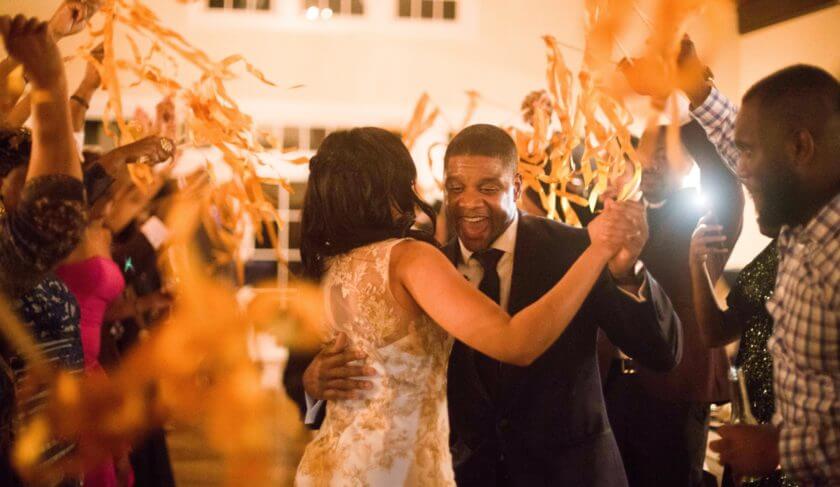
On one hand, you’re considering a beautiful sanctuary. On the other, you’ve got a pristine beach, dolphins frolicking on the horizon… And you might also have the offer of a home from a generous friend or family member. Where, oh where, will you tie the knot? Everyone and your mother (not to mention your future mother-in-law) wants to know.
No doubt you’d like to answer this question too. But breaking it down is hard to do.
Etiquette expert Jodi R.R. Smith says she tells couples to start with love, then do the budget.
“You can have the wedding of your dreams as long as you have your budget and you have some creativity,” says Smith, founder of Mannersmith Etiquette Consulting.
Jen Glantz, founder of Bridesmaid for Hire and The Newlywed Card Game, notes that once you know how much you want to spend — and can spend without going into debt — you can divvy up the money based on your priorities.
“If you want to do a destination wedding, add a category for your own travel and factor that in with other costs,” she writes. If you find you’re spending the same amount on travel as the wedding venue, she continues, you can probably assume if you wed at home, those extra funds would account for having a larger number of guests.
So, according to Glantz, “if you’re comfortable with cutting your guest list and adding that cash to your own travel fund, then go ahead, stress-free, with your destination plans.”
Sounds simple enough. But let’s pause here to talk numbers and definitions.
While destination weddings often involve fewer guests, that’s not always the case.
Jen Avey, VP of Marketing for Destination Weddings Travel Group, notes that the average number of guests who attended a destination wedding in 2020 was 26. But, she adds, some couples host more than 100 guests at such celebrations.
Secondly, definitions. As Avey notes, everyone’s definition of a destination wedding can differ.
While Avey’s company specializes in all-inclusive destination weddings in typically tropical locations, she notes that historically, a destination wedding was defined as getting married more than 200 miles from where you live.
Glantz, meanwhile, defines a destination wedding as any wedding where more than half of your guests will have to travel and book a hotel stay for two or more nights. Smith recognizes a destination wedding as one occurring where no one in the wedding couple or family lives.
Wherever you celebrate, some financial responsibilities will remain the same.
Noting that the cost of weddings varies greatly, Avey notes that regardless of locale, the couple is typically responsible for the venue, flowers, entertainment and reception dinner. Guests at a destination wedding often cover their own airfare and accomodations, she adds.
When it comes to building your guest list, Avey notes that her company recommends first creating a list of everyone you’d invite to a local wedding, and then pare down to those you’d invite to a destination wedding.
“It’s important to consider your guests’ budget and geographic location when choosing where to get married,” she writes, noting that many couples poll family and friends to determine who would be willing to travel for the event.
Glantz advises couples to plan that 85 percent of guests invited to a destination wedding will attend. Then, if fewer do, the couple can use the extra cash for something else or put it in the bank. Some couples only account for 60 to 75 percent of invitees to accept such invitations, she notes, and then their budget is busted when more accept.
No one wants that.
Beyond creating budgets for themselves, Smith encourages couples to have information available for guests as well. Those invited to be part of the wedding party, for example, should know their financial obligations. Wedding websites, she notes, can be good places to identify activities and any associated costs.
“We are not allowed to spend other people’s money, vacation money or vacation leave,” says Smith, who notes that couples may take on more financial responsibility for guests’ meals, airfare and accommodations when the wedding is far from home.
Glantz shares that in addition to determining your budget for a destination wedding, you should also do a “gut check” and decide with whom you want to spend your time; a destination wedding, she notes, means more events with your guests.
Offering another perspective, Avey asks if you’d rather spend a few hours mingling with hundreds in a banquet hall, or “several days in paradise making unforgettable memories with your closest friends and family?”
Ultimately, this may involve some hard decision-making.
The idea that the wedding is only about the couple is an unstable foundation for a marriage, Smith says, qualifying that she is not talking about those who come from dysfunctional or abusive families. Couples from fairly “normative” families need to take parents and extended family members into account “because these are people who are going to be in your lives going forward,” she says.
Finally, for those who may have wed in very small ceremonies and wish to have larger celebrations later, Smith suggests renewing vows.
If you won’t go into debt doing so, she says, maximize a happy occasion. Observes Smith: “Life is short.”
MORE ON HERMONEY:
- I’m Getting Married: How Do I Protect Myself Financially
- 7 Financial Discussions to Have Before You Get Married
- The 9 Ways to Blow Your Wedding Budget (And How To Avoid It)
Get more money saving + money making tips delivered right to your inbox: Subscribe to HerMoney today!







